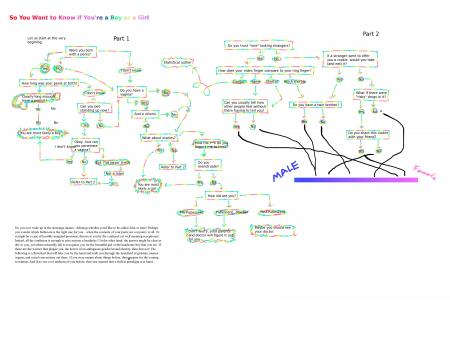Serendip is an independent site partnering with faculty at multiple colleges and universities around the world. Happy exploring!
Sex and Gender Flowchart
The following is a satirical piece assembled for an audience of youth and peers. It is meant to illustrate the importance of biology and scientific studies with regards to their influence upon dominant discourse within our culture – regardless of whether those findings are conceptually relevant, methodologically rigid, or statistically significant. Scientific studies are often grasped and cited in the process of forming policy and promoting social agendas. Such use of scientific data is theoretically ideal, so that policies might be informed by factual understanding and thus work towards aiding populations to which they apply. Unfortunately however, data is often misinterpreted and reinterpreted. The practice of drawing upon “scientific studies” in order to bolster an argument is common and widespread. This practice hinges upon a Western epistemology that privileges science and rationality, thereby conflating it with authoritative power. It is therefore no surprise when a politician throws in a statistical figure, or when a scientific study is cited by legislators. The use of such scientific data is a means by which authority is gained, as it (authority) is conferred upon the subject by an unquestioned body of knowledge that is called upon. Furthermore, the use of scientific data is by no means confined to the realm of politics or policy – it is gratuitously used in mainstream media: as the crux of an advertisement, appearing as trivia in television shows, or even disseminated as fact on the news. It is thus that data derived from scientific studies are of great importance, and scientists ought to be aware of what impact their work has. Even if a study fails to make a significant impact within the realm of scientific study, it is not useless, nor will it go unnoticed.
The project is a flowchart consisting of two parts. It examines aspects of biological sex, as well as subtly incurring the biological foundations for social constructions of gender. The flowchart is not meant to be cohesive. Rather, it starts as vaguely cohesive but then unravels along the way. It is meant to be a satirical illustration of how scientific data might be assembled and interpreted by the general public – with disregard for distinction between sex and gender, without cohesion between different assertions/points, and also without a distinct conclusion.

| Attachment | Size |
|---|---|
| Flowchart.jpg | 595.29 KB |



Comments
novel graphic
What a clever idea to construct a decision-making tree that incorporates biological "determinants" and behavioral expectations surrounding sex/gender! (My favorite parts were the "statistical outlier" that spun out from the studies on 2D:4D ratios and the gender split on "do you share this cookie (with risky drugs in it) with a friend?") While the graphic was richly detailed and even factored in potential confounding variables (like having a male twin), you might have added the length of penis that qualifies one unequivocally as a boy.
In introducing your flow-chart, you argue that scientists need to be aware of the potential impact of their work because of the cultural authority of science and mention that even weak data can be used to inform social policy and perpetuate discriminatory practices. Specific examples of such misuse of scientific data were included in Roughgarden's text and citing them would have strengthened your claim.
While the graphic was a delightfully satirical critique of biomedical authority, I was somewhat uncomfortable with the text, "Do you ever wake up in the morning...," which seemed to make light of the anxiety that people with ambiguous genitalia might feel. I'm curious whether you've received (or sought out) feedback about how this might be experienced by people who are intersex?